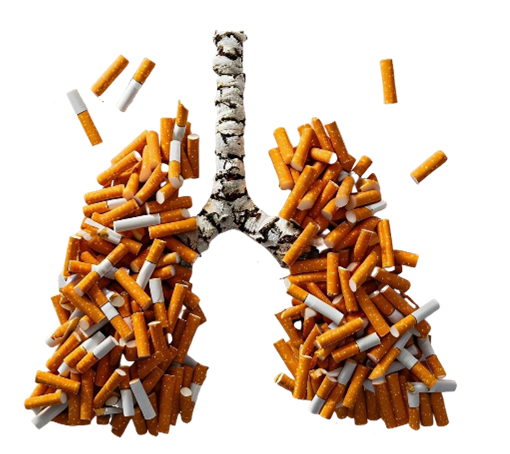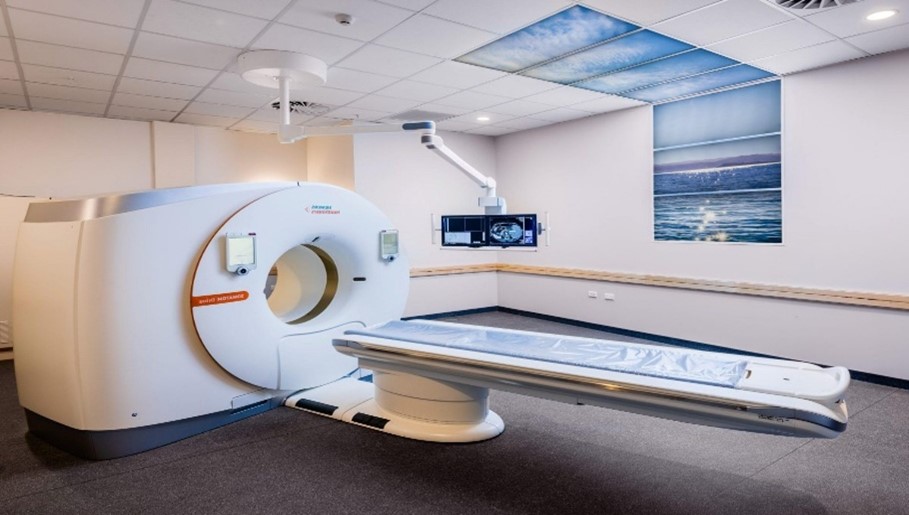What is Lung Cancer?
|
 |
Lung Cancer Facts and Statistics
Worldwide 2022
- Globally, Lung cancer is the world’s leading dominant cancer with the highest incidence and mortality compared to other cancer types (accounting for 12.4% of all cancer cases, and 18.7% of all cancer deaths).
- By 2022, about 2.4 million new cases occurred and 1.8 million people died from lung cancer worldwide.
- For men, it’s the most common cancer and the leading cause of cancer deaths, while the second among women following breast cancer.
Abu Dhabi Emirate 2023
- Lung cancer is the sixth most common cancer in the Emirate of Abu Dhabi, and the second leading cause of cancer deaths.
- Incidence and deaths rates are higher among men than in women in Abu Dhabi.
Risk Factors of Lung Cancer
- Smoking tobacco and exposure to second-hand smoke.
- Air pollution.
- Exposure to radon gas.
- Exposure to chemicals/ hazardous substances at workplace
- Personal or family history of lung diseases.
- Lowered immunity.
Tobacco use and Lung Cancer
According to WHO, smoking tobacco is the major risk factor for lung cancer. It’s responsible for 85% of all cases, and 71% of all lung cancer deaths.
|
Risk of lung cancer due to tobacco use depends on:
|
 |
Signs and Symptoms of Lung Cancer
Symptoms take years to develop and may not appear until the disease is at advanced stages, while early symptoms are usually mild or dismissed as common respiratory issues leading to delayed diagnosis. It’s important to contact the healthcare provider immediately when any symptoms are noticed.
- Shortness of breath/Wheezing.
- Chest pain.
- Intense/persistent cough.
- Coughing up blood.
- Change in sputum color.
- Hoarseness/Voice changes.
- Recurrent lung problems.
- Uncontrolled weight loss.
Lung Cancer Prevention:
Although not all lung cancer cases can be prevented, but there are ways to reduce the risk.
- Avoid all tobacco products and exposure to secondhand smoke
- Lower exposure to cancer-causing agents at workplace by following health and safety instructions.
- Limit exposure to radon gas inside homes/buildings. Consult local authorities about best practices.
- Adopt a healthy lifestyle.
- Avoid excessive use of supplements to prevent lung cancer. Beta Carotene supplement showed to increase lung cancer risk in smokers, and Vitamin E had no effect in reducing the risk.
- Ensure adherence to regular screening and early detection checkups as per doctor recommendations.
Regular Screening and Early Detection of Lung Cancer
Screening is a process that aims to finding diseases at an early stage when most treatable. LDCT scan (Low-dose Computed Tomography) is the known approved test for lung cancer screening which have proven to save lives and reduce lung cancer deaths among heavy smokers by up to 20% in comparison to regular chest X-ray.

How it works?
LDCT scan doesn’t diagnose lung cancer, but it involves the use of X-ray machine with low-doses of radiation that helps form detailed images of what is inside the body, those images capture abnormal masses in the lungs that can be further tested for cancer.
Eligibility for lung cancer screening
LDCT scan is recommended once a year for people at high risk of developing lung cancer who meets the following criteria:
- Men and women between 55 - 75 years old, and
- Healthy with no symptoms of lung cancer, and
- Currently smoke or quit smoking within the past 15 years, and
- Have smoking history of 20 to 30-Pack-Years (smoking 1 pack of cigarette per day for 20 or 30 years), or
- Have smoking history of 20-Years of smoking other types such as: water pipe (shisha) and/or Medwakh for 20 years).
Health insurance coverage
- For Thiqa- card holders, screening and treatments are fully covered in consistent with the DOH Standard for Thiqa Preventive List of Interventions.
- For non-Thiqa holders, coverage must be consistent with the individual’s health insurance plan.
Where to go for lung cancer screening in Abu Dhabi?
12 healthcare facilities are licensed to provide lung cancer screening services across Abu Dhabi Emirate.
|
Facility Name |
Contact |
Region |
|||||
| 1. |
Cleveland Clinic Abu Dhabi (CCAD) |
800 82223 |
Abu Dhabi |
||||
| 2. |
Burjeel Medical City L.L.C |
800 23 |
Abu Dhabi |
||||
| 3. |
Burjeel Day Surgery Center L.L.C |
800 55 |
Abu Dhabi |
||||
| 4. |
Burjeel Hospital L.L.C |
800 55 |
Abu Dhabi |
||||
| 5. |
Burjeel Royal Hospital L.L.C |
800 55 |
Abu Dhabi |
||||
| 6. |
Al Zafranah Diagnostic & Screening Center |
800 50 |
Abu Dhabi |
||||
| 7. |
Al Bahya Healthcare Center |
800 50 |
Abu Dhabi |
||||
| 8. |
Medeor 24x7 Hospital - L.L.C |
800 55 |
Abu Dhabi |
||||
| 9. |
Burjeel Royal Hospital Asharej - L.L.C |
800 55 |
Al Ain |
||||
| 10. |
Neima Healthcare Center |
800 50 |
Al Ain |
||||
| 11. |
Oud Al Touba Diagnostic & Screening Center |
800 50 |
Al Ain |
||||
| 12. |
Al Dhannah Hospital |
800 7267 |
Al Ruwais - Dhafra |
||||
|
Lung Cancer screening services available through
|
 |
Awareness Materials:
